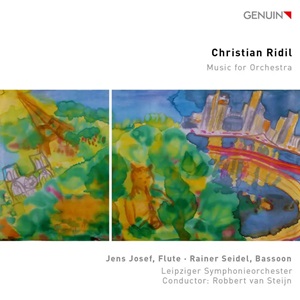
Christian Ridil (b. 1943)
Music for Orchestra
Les Jardins de Pan (1991)
Pictures of a City (1996-98)
Brahms in Paris (1994)
Jens Josef (flute); Rainer Seidel (bassoon)
Leipziger Symphonieorchester/Robbert van Steijn
rec. 2022, Kulturhaus, Böhlen, Germany
Genuin GEN 24903 [67]
Christian Ridil was born in Breslau and in his early years sang as a chorister in the Regensburg Domspatzen. His college education saw him study school music and composition under Günter Bialas at the State Academy of Music in Munich. He then developed a long career as a musicologist, notably at the University of Frankfurt, retiring in 2008. Alongside his academic work, he found time to perform and compose and he has written a significant body of choral music. Genuin have previously released three discs of his chamber music. This disc, however, is made up of purely orchestral music and I have been very surprised by his sound world.
I listened to the works before I read anything about them and was struck by how French they sounded – not German at all. Not the world of Boulez et al, but the irreverent ones: Poulenc being naughty, Francaix playful, Sauget demure, and Ibert adventurous. On reading the notes, I found my ears were not wrong and Herr Ridil was thinking in French when he wrote them.
Les Jardins de Pan, a concerto for flute, was inspired by the great god Pan much associated with woods and forests but also, and more pertinently, by visits the composer had made over the years to magnificent gardens particularly “in the French style”. Incongruously, although the title of the work is in French all the speed directions for the three movements are in German. The writing is brilliant and virtuosic; much, influenced, it sounds, by the French school of playing, like the Ibert Concerto on steroids. The outer movements are playfully raucous; the slow movement provides some respite, although the quieter moments are interrupted by rowdy elements, perhaps Dionysus bursting in on the godly repose. The music is based on a five-note motif derived from letters in Jens Josef’s name. Herr Josef is called upon to play not only the standard flute but also piccolo and alto flute. At almost twenty-five minutes, it outstays its welcome, its busyness overwhelming my eardrums.
The composer describes his Pictures of a City as his Symphony No 1, though I did not really hear much of what I would expect in symphonic development in the work. It comes across as three expertly scored mini tone poems depicting aspects of city life. Unlike Gershwin or Milhaud, the composer says he did not have a particular large city in mind. Rush Hour opens the work in brilliant fashion, with the participants rushing to or from work. There is not one of the thousands of notes out of place and it would make a brilliant concert opener. It is followed by On the River, but I could not detect anything particularly river-like about the music. There is none of Ives’ Housatonic, or Maconchy’s Proud Thames, or Smetana’s’ Moldau. It is quite disturbingly cacophonous nocturnal music. The unexpected changes in register and dynamic are perfectly captured by the engineers. The finale, Nightlife, follows on in unsettling vein. The jazzy nightclubs are swiftly left behind and the rest is definitely not a nightlife I would wish to experience. It contains another odd mix of languages, all the titles being in English but the musical directions in German.
Brahms in Paris? What a preposterous idea and yet this is just the ‘what if’ snapshot that the composer chooses to explore in his three-movement bassoon concerto. The music, so the composer tells us, tries to bridge the gap between German severity and French légèreté. He tells us Les Six was in his mind when he wrote it, but Jean Francaix seems to the fore to me. Is the bassoon Herr Brahms’? If so, he is clearly in heavy disguise. The writing for the instrument is, in the French manner, often alarmingly high and apart from a title and some traditional Germanic forms there is nothing Brahmsian here. That said, it is a quirkily fun work and as in the flute concerto the soloist is made to work hard for his fee. I was shocked to hear applause at the end of both concertos, so quiet is the audience throughout.
The Leipziger Symphonieorchester, under the direction of chief conductor Robbert van Steijn, plays this rhythmically complex and technically difficult music with great panache. That some were live performances is astonishing. The disc has intrigued me. Ridil clearly has a highly inventive and colourful mind and the ability to put his inner sound world down with great clarity. If you buy it, however, I would suggest listening to the three works in different sessions, as all at once results in sonic saturation.
Paul RW Jackson
Buying this recording via a link below generates revenue for MWI and helps us keep free access to the site



















